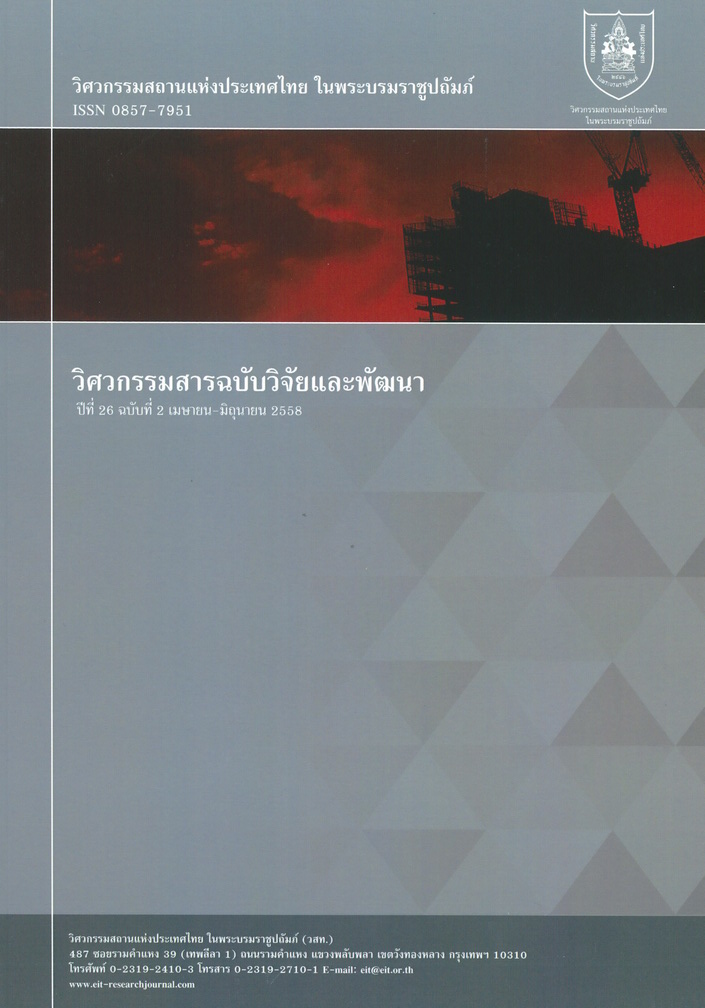DEVELOPMENT OF LOAD MODELING BY USING MULTI-AGENT SYSTEMS WITH KALMAN FILTER
Main Article Content
Abstract
บทความนี้ได้นำเสนอการศึกษาและพัฒนาการสร้างแบบจำลองโหลดด้วยระบบมัลติเอเจนท์ โดยใช้ข้อมูลการวัดจากสถานีไฟฟ้าย่อยมหาวิทยาลัยเทคโนโลยีสุรนารี เพื่อนำมาสร้างแบบจำลองโหลดที่สามารถแทนลักษณะของโหลดในเวลาต่าง ๆ โดยแบบจำลองโหลดในงานบทความนี้ได้เลือกใช้แบบจำลองโหลดแบบสถิตที่เรียกว่าแบบจำลองโหลด ZIP ซึ่งง่ายต่อการคำนวณและไม่ยุ่งยากในการสร้างแบบจำลองแต่ยังให้ประสิทธิภาพที่ดี และได้ใช้ตัวกรองคาลมานเพื่อลดผลกระทบอันเนื่องจากสัญญาณรบกวนที่เกิดขึ้นในระบบและผลกระทบจากความคลาดเคลื่อนของเครื่องมือวัด ซึ่งผลการทดสอบแสดงให้เห็นว่าตัวกรองคาลมานลดผลกระทบอันเนื่องจากสัญญาณรบกวนได้ดีและยังไม่กระทบกับลักษณะของโหลดอีกด้วย โดยกระบวนการตั้งแต่การลดผลกระทบเนื่องจากสัญญาณรบกวนด้วยตัวกรองไปจนถึงการคำนวณหาพารามิเตอร์ของแบบจำลองโหลดนั้นได้ออกแบบให้ทำงานอย่างเป็นระบบด้วยเทคโนโลยีมัลติเอเจนท์ จากคุณสมบัติของเทคโนโลยีมัลติเอเจนท์นี้สามารถทำงานได้อย่างอัตโนมัติและไม่จำเป็นต้องมีผู้ปฏิบัติการทำงานอยู่ตลอดเวลา ในบทความนี้จึงมีวัตถุประสงค์เพื่อพัฒนาการสร้างแบบจำลองโหลดให้สามารถแสดงพฤติกรรมของโหลดได้ถูกต้อง ด้วยการอาศัยเทคโนโลยีมัลติเอเจนท์และใช้ตัวกรองคาลมานในการลดสัญญาณรบกวนจากเครื่องมือวัด
This paper presents a study and development of load modeling by using multi-agent technology with measurement data from Suranaree University of Technology substation for making time-dependent load model. The load model is the static load model called ZIP-model (constant impedance, constant current and constant power model), which is easy to compute model parameters and also to provide good performance. In addition, error or noise from measurement devices is inevitable, thus a filter is a tool for reducing the effects caused by noise disturbance occurred in the system or by measuring devices. Comparing of effectiveness between the Kalman filter and the single moving average filter (SMA) shows that the Kalman filter can better reduce the effects caused by system and measurement noises and there is no effect on the characteristics of the load. The process to reduce the effect of noises by using a filter before calculating the load model is designed to perform on multi-agent systems. This paper used JADE as a tool to create and control the operation of the agent. JADE is the Java language that can work on all operating system that Java can be operated. The use of agent technology leads to automatic operations and requires no operator to monitor the system all the times. The objective of this research is to develop accurate load modeling with Kalman filter to reduce noises incorporating with multi-agent technology to implement the system operation automatically.
Article Details
The published articles are copyright of the Engineering Journal of Research and Development, The Engineering Institute of Thailand Under H.M. The King's Patronage (EIT).


